Unit 4 I used to be afraid of the dark 单元教学案(4课时)
文档属性
| 名称 | Unit 4 I used to be afraid of the dark 单元教学案(4课时) | 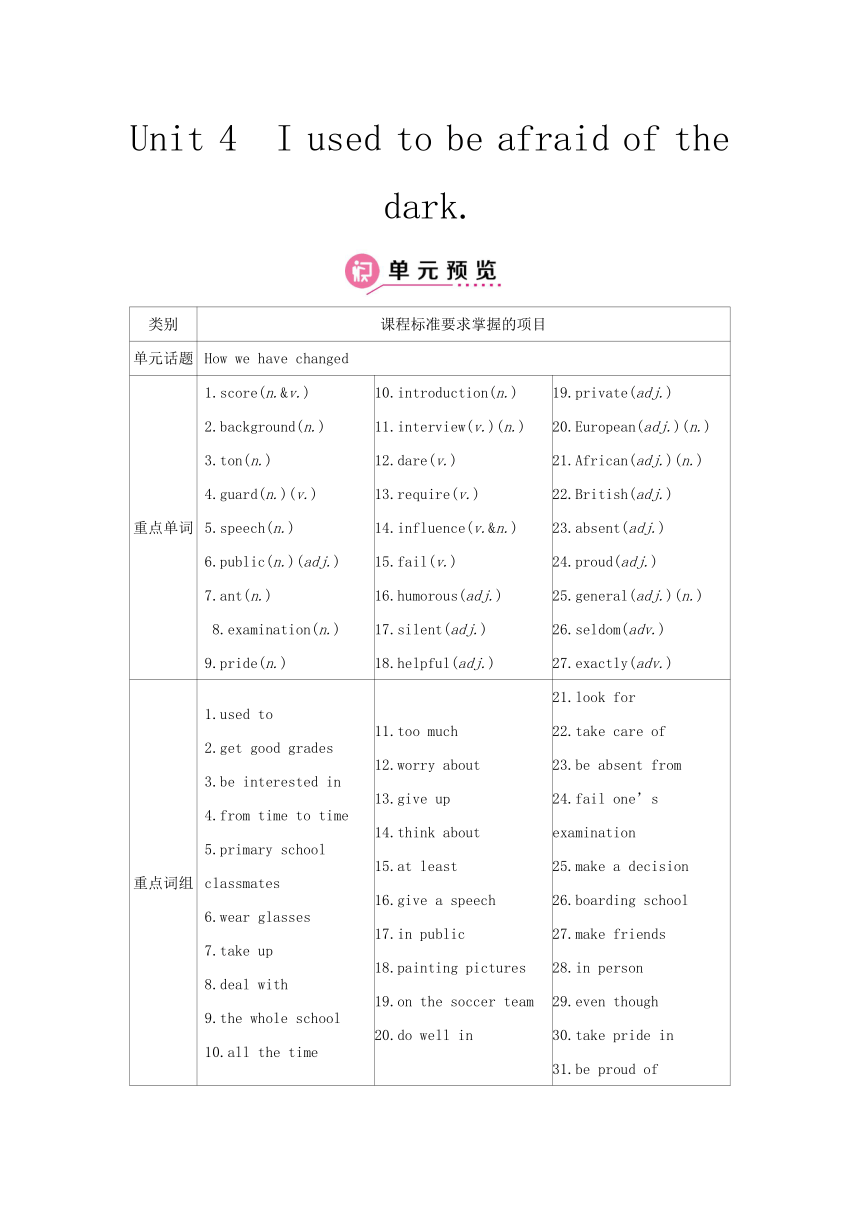 | |
| 格式 | docx | ||
| 文件大小 | 79.1KB | ||
| 资源类型 | 教案 | ||
| 版本资源 | 人教新目标(Go for it)版 | ||
| 科目 | 英语 | ||
| 更新时间 | 2021-09-11 13:26:31 | ||
图片预览

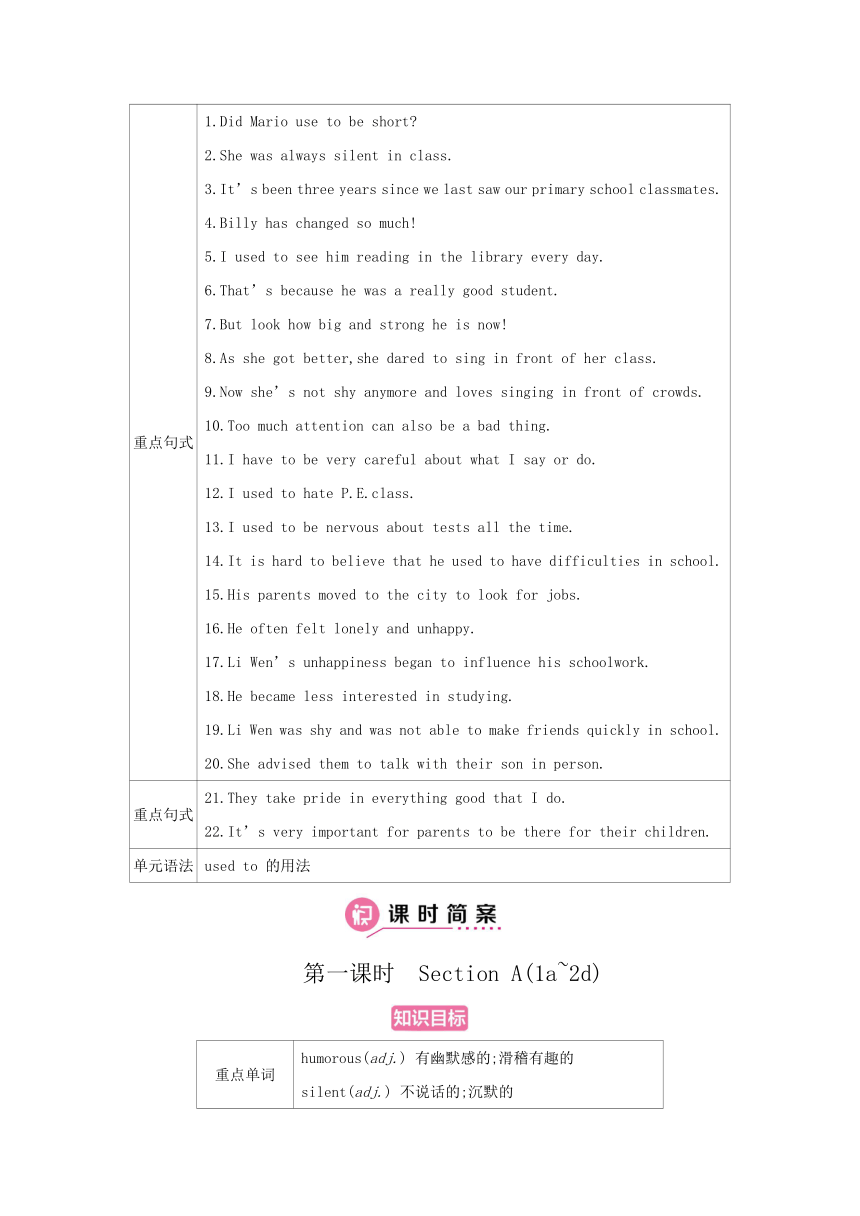
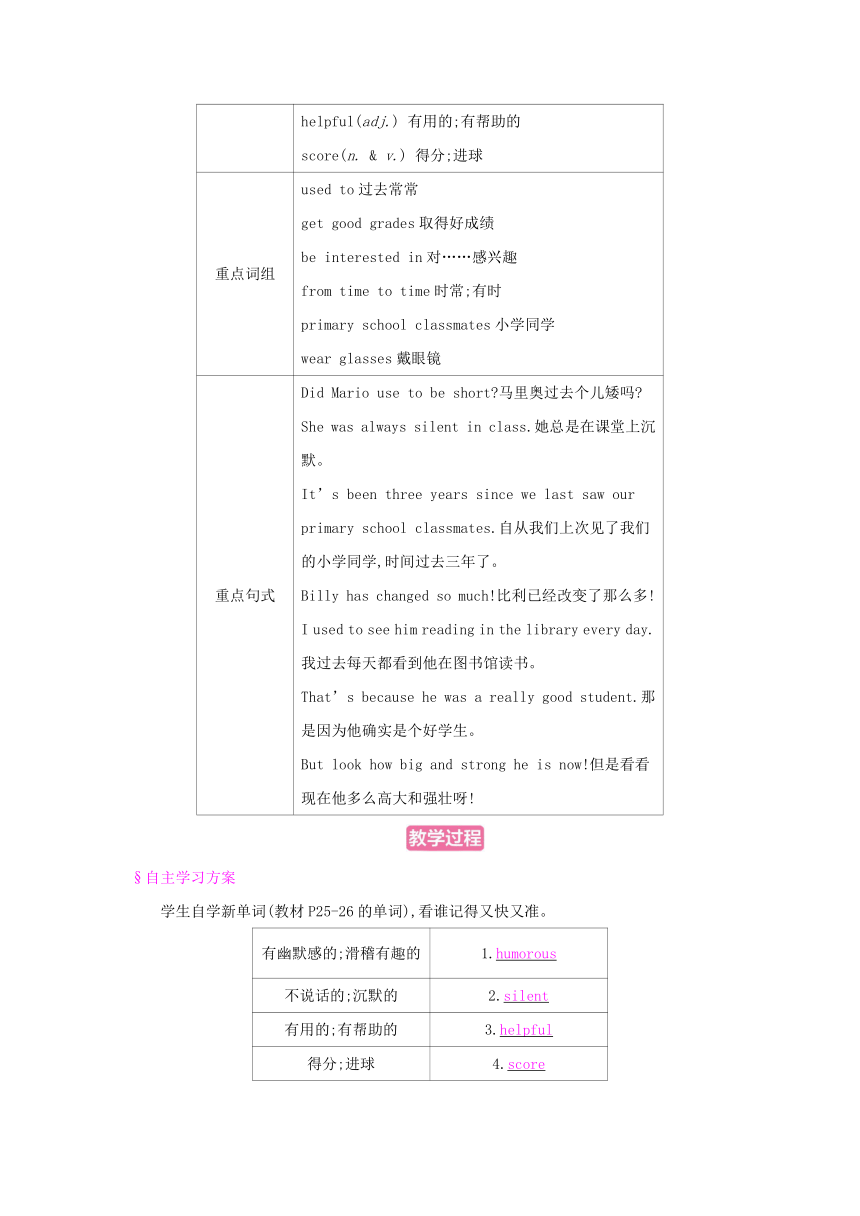
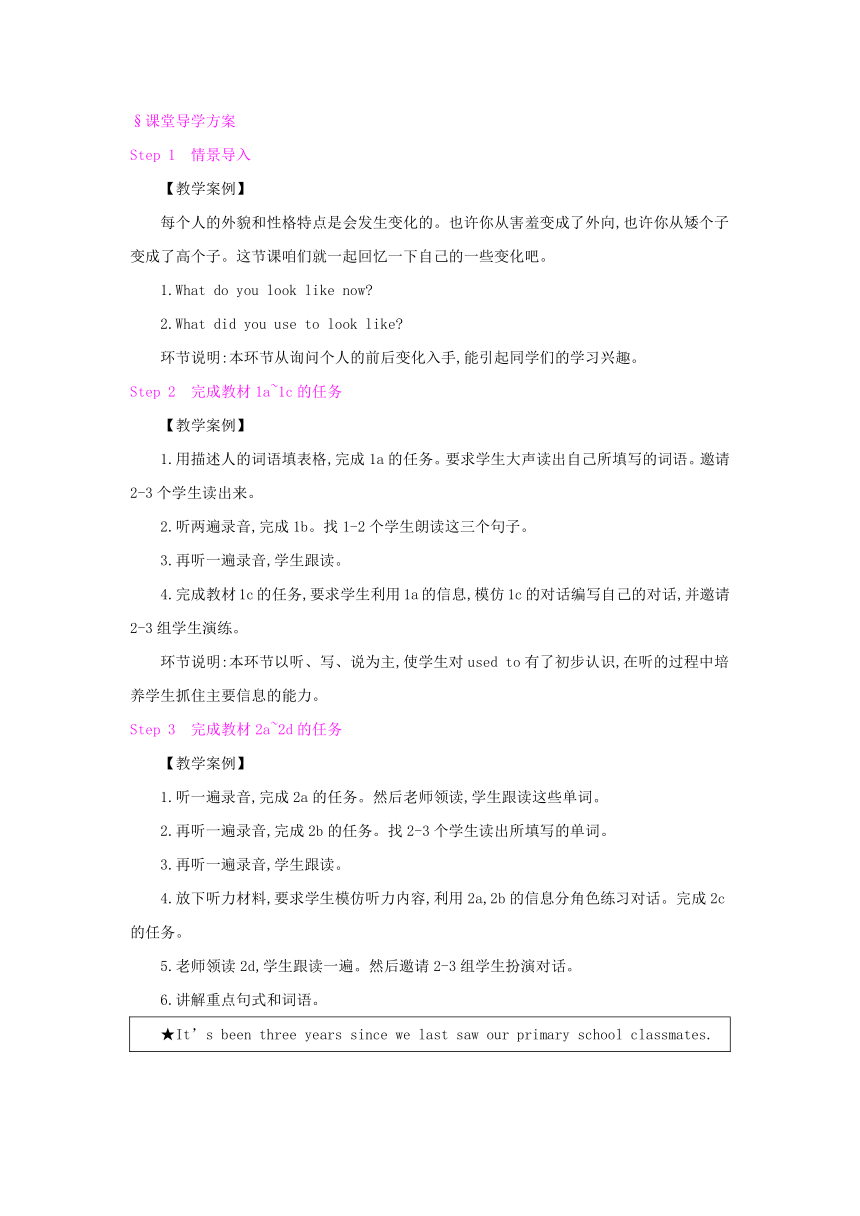
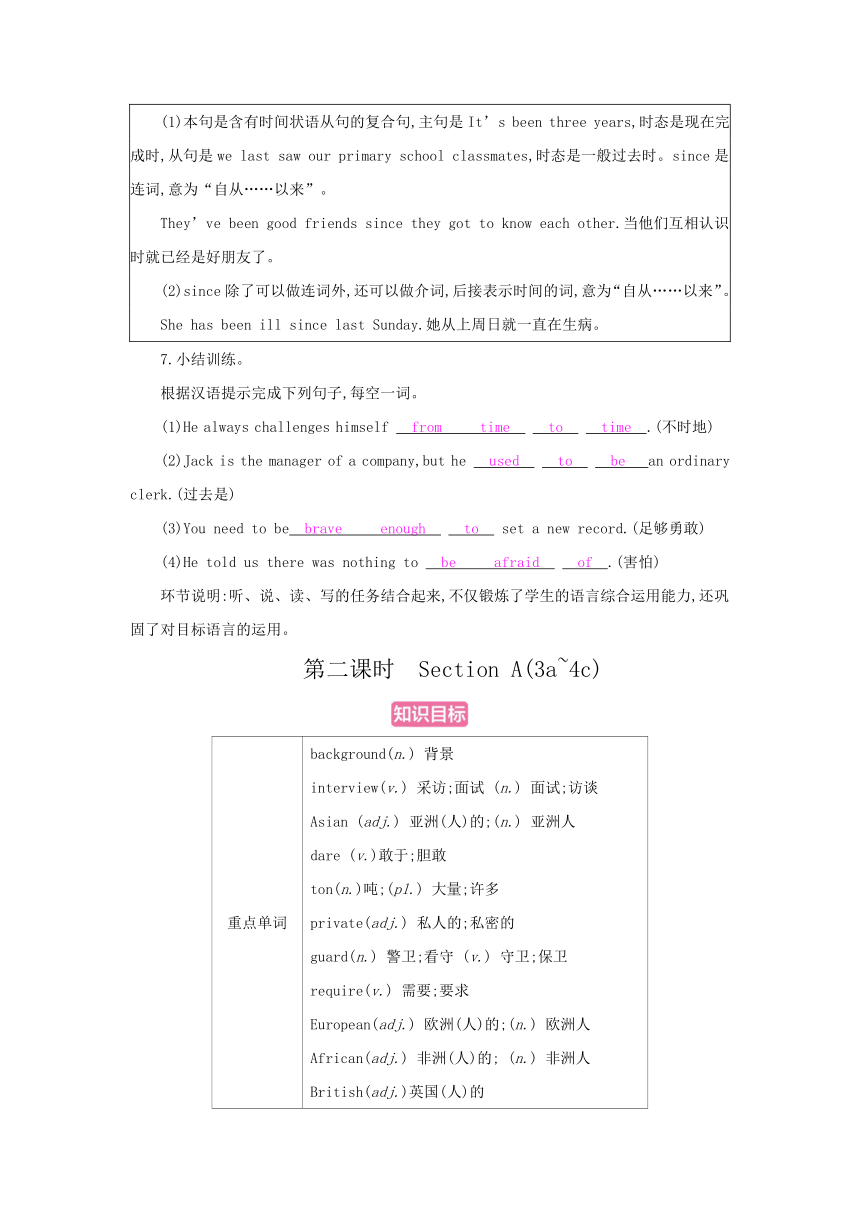
文档简介
Unit
4
I
used
to
be
afraid
of
the
dark.
类别
课程标准要求掌握的项目
单元话题
How
we
have
changed
重点单词
1.score(n.&v.)
2.background(n.)
3.ton(n.)
4.guard(n.)(v.)
5.speech(n.)
6.public(n.)(adj.)
7.ant(n.)
8.examination(n.)
9.pride(n.)
10.introduction(n.)
11.interview(v.)(n.)
12.dare(v.)
13.require(v.)
14.influence(v.&n.)
15.fail(v.)
16.humorous(adj.)
17.silent(adj.)
18.helpful(adj.)
19.private(adj.)
20.European(adj.)(n.)
21.African(adj.)(n.)
22.British(adj.)
23.absent(adj.)
24.proud(adj.)
25.general(adj.)(n.)
26.seldom(adv.)
27.exactly(adv.)
重点词组
1.used
to
2.get
good
grades
3.be
interested
in
4.from
time
to
time
5.primary
school
classmates
6.wear
glasses
7.take
up
8.deal
with
9.the
whole
school
10.all
the
time
11.too
much
12.worry
about
13.give
up
14.think
about
15.at
least
16.give
a
speech
17.in
public
18.painting
pictures
19.on
the
soccer
team
20.do
well
in
21.look
for
22.take
care
of
23.be
absent
from
24.fail
one’s
examination
25.make
a
decision
26.boarding
school
27.make
friends
28.in
person
29.even
though
30.take
pride
in
31.be
proud
of
重点句式
1.Did
Mario
use
to
be
short?
2.She
was
always
silent
in
class.
3.It’s
been
three
years
since
we
last
saw
our
primary
school
classmates.
4.Billy
has
changed
so
much!
5.I
used
to
see
him
reading
in
the
library
every
day.
6.That’s
because
he
was
a
really
good
student.
7.But
look
how
big
and
strong
he
is
now!
8.As
she
got
better,she
dared
to
sing
in
front
of
her
class.
9.Now
she’s
not
shy
anymore
and
loves
singing
in
front
of
crowds.
10.Too
much
attention
can
also
be
a
bad
thing.
11.I
have
to
be
very
careful
about
what
I
say
or
do.
12.I
used
to
hate
P.E.class.
13.I
used
to
be
nervous
about
tests
all
the
time.
14.It
is
hard
to
believe
that
he
used
to
have
difficulties
in
school.
15.His
parents
moved
to
the
city
to
look
for
jobs.
16.He
often
felt
lonely
and
unhappy.
17.Li
Wen’s
unhappiness
began
to
influence
his
schoolwork.
18.He
became
less
interested
in
studying.
19.Li
Wen
was
shy
and
was
not
able
to
make
friends
quickly
in
school.
20.She
advised
them
to
talk
with
their
son
in
person.
重点句式
21.They
take
pride
in
everything
good
that
I
do.
22.It’s
very
important
for
parents
to
be
there
for
their
children.
单元语法
used
to
的用法
第一课时 Section
A(1a~2d)
重点单词
humorous(adj.)
有幽默感的;滑稽有趣的
silent(adj.)
不说话的;沉默的
helpful(adj.)
有用的;有帮助的
score(n.
&
v.)
得分;进球
重点词组
used
to过去常常
get
good
grades取得好成绩
be
interested
in对……感兴趣
from
time
to
time时常;有时
primary
school
classmates小学同学
wear
glasses戴眼镜
重点句式
Did
Mario
use
to
be
short?马里奥过去个儿矮吗?
She
was
always
silent
in
class.她总是在课堂上沉默。
It’s
been
three
years
since
we
last
saw
our
primary
school
classmates.自从我们上次见了我们的小学同学,时间过去三年了。
Billy
has
changed
so
much!比利已经改变了那么多!
I
used
to
see
him
reading
in
the
library
every
day.我过去每天都看到他在图书馆读书。
That’s
because
he
was
a
really
good
student.那是因为他确实是个好学生。
But
look
how
big
and
strong
he
is
now!但是看看现在他多么高大和强壮呀!
§自主学习方案
学生自学新单词(教材P25-26的单词),看谁记得又快又准。
有幽默感的;滑稽有趣的
1.humorous
不说话的;沉默的
2.silent
有用的;有帮助的
3.helpful
得分;进球
4.score
§课堂导学方案
Step
1 情景导入
【教学案例】
每个人的外貌和性格特点是会发生变化的。也许你从害羞变成了外向,也许你从矮个子变成了高个子。这节课咱们就一起回忆一下自己的一些变化吧。
1.What
do
you
look
like
now?
2.What
did
you
use
to
look
like?
环节说明:本环节从询问个人的前后变化入手,能引起同学们的学习兴趣。
Step
2 完成教材1a~1c的任务
【教学案例】
1.用描述人的词语填表格,完成1a的任务。要求学生大声读出自己所填写的词语。邀请2-3个学生读出来。
2.听两遍录音,完成1b。找1-2个学生朗读这三个句子。
3.再听一遍录音,学生跟读。
4.完成教材1c的任务,要求学生利用1a的信息,模仿1c的对话编写自己的对话,并邀请2-3组学生演练。
环节说明:本环节以听、写、说为主,使学生对used
to有了初步认识,在听的过程中培养学生抓住主要信息的能力。
Step
3 完成教材2a~2d的任务
【教学案例】
1.听一遍录音,完成2a的任务。然后老师领读,学生跟读这些单词。
2.再听一遍录音,完成2b的任务。找2-3个学生读出所填写的单词。
3.再听一遍录音,学生跟读。
4.放下听力材料,要求学生模仿听力内容,利用2a,2b的信息分角色练习对话。完成2c的任务。
5.老师领读2d,学生跟读一遍。然后邀请2-3组学生扮演对话。
6.讲解重点句式和词语。
★It’s
been
three
years
since
we
last
saw
our
primary
school
classmates.
(1)本句是含有时间状语从句的复合句,主句是It’s
been
three
years,时态是现在完成时,从句是we
last
saw
our
primary
school
classmates,时态是一般过去时。since是连词,意为“自从……以来”。
They’ve
been
good
friends
since
they
got
to
know
each
other.当他们互相认识时就已经是好朋友了。
(2)since除了可以做连词外,还可以做介词,后接表示时间的词,意为“自从……以来”。
She
has
been
ill
since
last
Sunday.她从上周日就一直在生病。
7.小结训练。
根据汉语提示完成下列句子,每空一词。
(1)He
always
challenges
himself
from
time
to
time .(不时地)?
(2)Jack
is
the
manager
of
a
company,but
he
used
to
be
an
ordinary
clerk.(过去是)?
(3)You
need
to
be brave
enough
to
set
a
new
record.(足够勇敢)?
(4)He
told
us
there
was
nothing
to
be
afraid
of .(害怕)?
环节说明:听、说、读、写的任务结合起来,不仅锻炼了学生的语言综合运用能力,还巩固了对目标语言的运用。
第二课时 Section
A(3a~4c)
重点单词
background(n.)
背景
interview(v.)
采访;面试
(n.)
面试;访谈
Asian
(adj.)
亚洲(人)的;(n.)
亚洲人
dare
(v.)敢于;胆敢
ton(n.)吨;(pl.)
大量;许多
private(adj.)
私人的;私密的
guard(n.)
警卫;看守
(v.)
守卫;保卫
require(v.)
需要;要求
European(adj.)
欧洲(人)的;(n.)
欧洲人
African(adj.)
非洲(人)的;
(n.)
非洲人
British(adj.)英国(人)的
speech(n.)
讲话;发言
public(n.)
民众;(adj.)
公开的;公众的
重点词组
take
up从事
deal
with处理
the
whole
school整个学校
all
the
time一直
too
much太多
worry
about担心
give
up放弃
think
about考虑
at
least至少
give
a
speech演讲
in
public公开地
重点句式
As
she
got
better,she
dared
to
sing
in
front
of
her
class.随着情况好转,她敢于在同学面前唱歌了。
Now
she’s
not
shy
anymore
and
loves
singing
in
front
of
crowds.现在她不再害羞,喜欢在观众面前唱歌了。
Too
much
attention
can
also
be
a
bad
thing.太多的注意可能也是一件坏事。
I
have
to
be
very
careful
about
what
I
say
or
do.我不得不小心我的言行。
§自主学习方案
学生自学新单词(教材P27-28的单词),看谁记得又快又准。
背景
1.background
采访;面试;访谈
2.interview
亚洲(人)的;
亚洲人
3.Asian
敢于;胆敢
4.dare
吨;(pl.)大量;许多
5.ton
私人的;私密的
6.private
警卫;看守;守卫;保卫
7.guard
需要;要求
8.require
欧洲(人)的;欧洲人
9.European
非洲(人)的;非洲人
10.African
英国(人)的
11.British
讲话;发言
12.speech
民众;公开的;公众的
13.public
§课堂导学方案
Step
1 情景导入
【教学案例】
名人对同学们的影响应该是很大的。你了解他们的过去吗?他们由不被人所知到后来的大名鼎鼎,都是经历过一番变化的。
1.Which
star
do
you
know
about?
2.What
did
he
/
she
use
to
be
like?How
have
they
changed?
环节说明:通过带着问题去学习,从而达到掌握新课的目的,同时也让同学们反思自己的学习和生活。
Step
2 完成教材3a~3c的任务
【教学案例】
1.要求学生默读课文,给三个段落选出不同的标题,完成3a的任务。
2.老师领读,学生跟读课文。
3.讲解重点句式和词语。
★Candy
told
me
that
she
used
to
be
really
shy
and
took
up
singing
to
deal
with
her
shyness.
deal
with意为“应对;处理”,与do
with同义。但要注意deal
with通常与how
一起使用,do
with通常与what
一起使用。
Could
you
give
me
some
advice
on
how
to
deal
with
stress
in
daily
life?你能给我一些在日常生活中如何应对压力的建议吗?
If
you
win
the
competition,what
will
you
do
with
the
prize
money?如果你赢得比赛,你将如何处理这笔奖金?
★As
she
got
better,she
dared
to
sing
in
front
of
her
class,…
dare表示“敢于;胆敢”,可做实义动词,有人称、数和时态的变化,后面跟动词不定式表示“敢于做某事”。dare也可做情态动词,没有人称和数的变化,后面直接跟动词原形,通常用于否定句或疑问句中,以及if或whether
之后,一般不用于肯定句中。
You
have
already
taken
the
first
step
to
success
when
you
dare
to
try.当你勇敢尝试时,你已经向成功迈出了第一步。
4.要求学生再次默读课文,完成3b的任务。邀请1-2个学生朗读这4个句子。然后订正答案。
5.两人一组,一个人扮演记者,另一个人扮演Candy,相互问答有关Candy的前后变化的情况,完成3c的任务。
环节说明:本环节将读、说、写结合起来,锻炼学生的语言综合运用能力。
Step
3 完成Grammar
Focus
~4c的任务
【教学案例】
1.要求学生朗读Grammar
Focus,总结出used
to
的用法。
2.用used
to
改写这些句子,完成4a的任务。邀请1-2个学生在黑板上写出答案。
3.仿照例句并造句,完成4b的任务。要求学生在练习本上写出来。邀请2—3个学生朗读他们所写的句子。
4.先根据自己的实际情况填写4c的表格,然后在小组内交流讨论,完成另一半表格。
环节说明:将读、写结合起来,能更好地让学生掌握语法点。
第三课时 Section
B(1a~1e)
重点单词
ant
(n.)蚂蚁
insect
(n.)
昆虫
重点词组
on
the
soccer
team
在足球队
重点句式
I
used
to
hate
P.E.class.我过去讨厌体育课。
I
used
to
be
nervous
about
tests
all
the
time.我过去对考试一直很紧张。
§自主学习方案
学生自学新单词(教材P29的单词),看谁记得又快又准。
蚂蚁
1.ant
昆虫
2.insect
§课堂导学方案
Step
1 情景导入
【教学案例】
在前面的课程中我们已经学习并了解了同学们外貌和身高的变化,以及现在和以前所害怕的东西。今天我们将一起讨论同学们的爱好。
环节说明:本环节过渡自然,能激发同学们的兴趣。
Step
2 完成教材1a~1e的任务
【教学案例】
1.阅读1a,勾出当你是个小孩子的时候你喜欢的事情。
2.邀请2—3个学生朗读1a的短语。
3.在小组内讨论,你还喜欢过的别的事情。用I
used
to
…句型写出来。
4.听第一遍录音,勾出你所听到的句子。
5.再听两遍录音,让学生完成1d的表格。老师订正答案。
6.再听一遍录音,学生跟读。
7.放下听力材料,要求学生模仿听力内容,利用1c,1d的信息分角色练习对话,完成1e的任务。然后邀请2—3组同学演练。
8.小结训练。
根据汉语提示完成下列句子,每空一词。
(1)We
saw
some ants
under
the
tree.(蚂蚁)?
(2)The
teacher
told
us
some
interesting
facts
about insects .(昆虫)?
(3)I
always
feel
nervous before
the
exam.What
should
I
do?(紧张的)
?
(4)He
doesn’t
like
to
do
the
housework.In
fact,he
hates it.(厌恶)
?
(5)My
elder
brother
used
to
be
on
a
soccer team
.(队)?
环节说明:本环节以听、写、读相结合,能很好地掌握目标语言,使学生对目标语言更好地识记和运用。
第四课时 Section
B(2a~Self
Check)
重点单词
seldom(adv.)
不常;很少
influence(v.
&
n.)
影响
absent(adj.)
缺席;不在
fail(v.)
不及格;失败;未能(做到)
examination(n.)考试;审查
exactly(adv.)
确切地;精确地
pride(n.)
自豪;骄傲
proud(adj.)
自豪的;骄傲的
general(adj.)
总的;普遍的;常规的(n.);将军
introduction(n.)
介绍
重点词组
do
well
in在……方面做得好
look
for寻找
take
care
of照顾
be
absent
from缺席
fail
one’s
examination考试不及格
make
a
decision做出决定
boarding
school寄宿学校
make
friends交朋友
in
person亲自
even
though即使
take
pride
in为……感到自豪
be
proud
of为……感到骄傲;为……感到自豪
重点句式
It
is
hard
to
believe
that
he
used
to
have
difficulties
in
school.难以相信的是他过去在学校有困难。
His
parents
moved
to
the
city
to
look
for
jobs.他的父母搬到城市寻找工作了。
He
often
felt
lonely
and
unhappy.他经常感到寂寞和不高兴。
Li
Wen’s
unhappiness
began
to
influence
his
schoolwork.李文的不高兴开始影响他的学业。
He
became
less
interested
in
studying.他变得对学习不感兴趣。
Li
Wen
was
shy
and
was
not
able
to
make
friends
quickly
in
school.李文很害羞,不能在学校快速地交上朋友。
She
advised
them
to
talk
with
their
son
in
person.她建议他们与儿子亲自谈一谈。
They
take
pride
in
everything
good
that
I
do.他们以我做的每件好事而自豪。
§自主学习方案
学生自学新单词(教材P30-32的单词),看谁记得又快又准。
不常;很少
1.seldom
影响
2.influence
缺席;不在
3.absent
不及格;失败
4.fail
考试;审查
5.examination
确切地;精确地
6.exactly
自豪;骄傲
7.pride
自豪的;骄傲的
8.proud
总的;普遍的;常规的;将军
9.general
介绍
10.introduction
§课堂导学方案
Step
1 情景导入
【教学案例】
这节课我们了解了一个留守儿童的故事。也许咱们的同学中也有留守儿童。现在回想一下你是否想念父母?你是怎样与父母沟通的?你的父母对你放心吗?
环节说明:本环节用提问题的方式,让学生回忆起与父母的关系,激发学生对父母的爱。
Step
2 完成教材2a~2c的任务
【教学案例】
1.老师简单介绍一下李文的情况。让学生们猜测李文存在一些什么问题。老师可以出示一些图片,帮助同学们猜测,完成2a的任务。
2.要求学生默读课文,将2b中的四个句子还原到课文中。
3.老师领读课文,学生跟读。
4.讲解重点句式和词语。
★When
he
was
a
little
boy,he
seldom
caused
any
problems,and
his
family
spent
a
lot
of
time
together.
seldom是副词,意为“很少;不常”,表示频率,通常放在行为动词之前,be动词、情态动词及助动词之后。
Sandy
likes
traveling.She
seldom
stays
at
home
during
holidays.辛迪喜欢旅游。在假期她很少在家待着。
★Li
Wen’s
unhappiness
began
to
influence
his
schoolwork.
influence既可以做动词也可做名词,意为“影响”。
做名词时常用搭配是have
an
influence
on
sb./
sth.,意为“对某人/某事有影响”。
My
math
teacher
has
a
great
influence
on
me.我的数学老师对我影响很大。
★They
take
pride
in
everything
good
that
I
do.
pride是名词,意为“自豪;骄傲”,常用短语:take
pride
in
“为……感到自豪”;proud是形容词,意为“自豪的;感到自豪的”,常用短语:be
proud
of
“为……骄傲;为……感到自豪”。take
pride
in
和be
proud
of
常可互换使用。
The
young
mother
took
pride
in
/
was
proud
of
her
son.那位年轻的妈妈为她的儿子感到自豪。
5.再读一遍课文,让学生找出李文过去存在的问题。
环节说明:本环节以学生自学为主,让学生在默读的过程中理解课文,对目标语言加以运用。
Step
3 完成教材2d~2f的任务
【教学案例】
1.用课文里的线索让学生猜测这四个词(组)的意思,完成2d的任务。
2.用方框中词语的适当形式填空,完成2e的任务。邀请1-2个学生朗读2e。
3.让学生分组讨论李文和他的父母谈了些什么,然后根据2f所给的提示,编一组李文与其父母的对话。邀请1-2组学生表演对话。
环节说明:将读、写、说结合起来不仅锻炼了学生的语言综合运用能力,还巩固了学生对目标语言的学习。
Step
4 完成教材3a~3b的任务
【教学案例】
1.写出你自己的变化的提要。可以从外貌、个性或者习惯方面入手。然后在小组内一起讨论你的变化。
2.要求学生根据3a写的提要以及3b中所给的提示写出自己是怎样改变的,包括自己以前是什么样子的,哪些变化比较重要及其原因。
Step
5 完成教材Self
Check的任务
1.用方框中所给词语的正确形式填空。
2.参照所给提示,描写你在小学时的样子,完成2的任务。
3.小结训练。
根据汉语提示,完成下列句子,每空一词。
(1)What
the
parents
say
and
do
will
influence their
children.(影响)
?
(2)You
will fail
in
French
unless
you
work
harder.(不及格)
?
(3)Lucy
always
takes pride
in
the
success
of
her
husband.(骄傲)?
(4)Mary
hates
swimming,so
she seldom
goes
swimming
with
her
friends.(很少)
?
(5)The
woman
was
ill,so
she
was absent from
the
meeting.(缺席)
?
环节说明:本环节主要是针对本单元的主要目标语言进行巩固训练。
4
I
used
to
be
afraid
of
the
dark.
类别
课程标准要求掌握的项目
单元话题
How
we
have
changed
重点单词
1.score(n.&v.)
2.background(n.)
3.ton(n.)
4.guard(n.)(v.)
5.speech(n.)
6.public(n.)(adj.)
7.ant(n.)
8.examination(n.)
9.pride(n.)
10.introduction(n.)
11.interview(v.)(n.)
12.dare(v.)
13.require(v.)
14.influence(v.&n.)
15.fail(v.)
16.humorous(adj.)
17.silent(adj.)
18.helpful(adj.)
19.private(adj.)
20.European(adj.)(n.)
21.African(adj.)(n.)
22.British(adj.)
23.absent(adj.)
24.proud(adj.)
25.general(adj.)(n.)
26.seldom(adv.)
27.exactly(adv.)
重点词组
1.used
to
2.get
good
grades
3.be
interested
in
4.from
time
to
time
5.primary
school
classmates
6.wear
glasses
7.take
up
8.deal
with
9.the
whole
school
10.all
the
time
11.too
much
12.worry
about
13.give
up
14.think
about
15.at
least
16.give
a
speech
17.in
public
18.painting
pictures
19.on
the
soccer
team
20.do
well
in
21.look
for
22.take
care
of
23.be
absent
from
24.fail
one’s
examination
25.make
a
decision
26.boarding
school
27.make
friends
28.in
person
29.even
though
30.take
pride
in
31.be
proud
of
重点句式
1.Did
Mario
use
to
be
short?
2.She
was
always
silent
in
class.
3.It’s
been
three
years
since
we
last
saw
our
primary
school
classmates.
4.Billy
has
changed
so
much!
5.I
used
to
see
him
reading
in
the
library
every
day.
6.That’s
because
he
was
a
really
good
student.
7.But
look
how
big
and
strong
he
is
now!
8.As
she
got
better,she
dared
to
sing
in
front
of
her
class.
9.Now
she’s
not
shy
anymore
and
loves
singing
in
front
of
crowds.
10.Too
much
attention
can
also
be
a
bad
thing.
11.I
have
to
be
very
careful
about
what
I
say
or
do.
12.I
used
to
hate
P.E.class.
13.I
used
to
be
nervous
about
tests
all
the
time.
14.It
is
hard
to
believe
that
he
used
to
have
difficulties
in
school.
15.His
parents
moved
to
the
city
to
look
for
jobs.
16.He
often
felt
lonely
and
unhappy.
17.Li
Wen’s
unhappiness
began
to
influence
his
schoolwork.
18.He
became
less
interested
in
studying.
19.Li
Wen
was
shy
and
was
not
able
to
make
friends
quickly
in
school.
20.She
advised
them
to
talk
with
their
son
in
person.
重点句式
21.They
take
pride
in
everything
good
that
I
do.
22.It’s
very
important
for
parents
to
be
there
for
their
children.
单元语法
used
to
的用法
第一课时 Section
A(1a~2d)
重点单词
humorous(adj.)
有幽默感的;滑稽有趣的
silent(adj.)
不说话的;沉默的
helpful(adj.)
有用的;有帮助的
score(n.
&
v.)
得分;进球
重点词组
used
to过去常常
get
good
grades取得好成绩
be
interested
in对……感兴趣
from
time
to
time时常;有时
primary
school
classmates小学同学
wear
glasses戴眼镜
重点句式
Did
Mario
use
to
be
short?马里奥过去个儿矮吗?
She
was
always
silent
in
class.她总是在课堂上沉默。
It’s
been
three
years
since
we
last
saw
our
primary
school
classmates.自从我们上次见了我们的小学同学,时间过去三年了。
Billy
has
changed
so
much!比利已经改变了那么多!
I
used
to
see
him
reading
in
the
library
every
day.我过去每天都看到他在图书馆读书。
That’s
because
he
was
a
really
good
student.那是因为他确实是个好学生。
But
look
how
big
and
strong
he
is
now!但是看看现在他多么高大和强壮呀!
§自主学习方案
学生自学新单词(教材P25-26的单词),看谁记得又快又准。
有幽默感的;滑稽有趣的
1.humorous
不说话的;沉默的
2.silent
有用的;有帮助的
3.helpful
得分;进球
4.score
§课堂导学方案
Step
1 情景导入
【教学案例】
每个人的外貌和性格特点是会发生变化的。也许你从害羞变成了外向,也许你从矮个子变成了高个子。这节课咱们就一起回忆一下自己的一些变化吧。
1.What
do
you
look
like
now?
2.What
did
you
use
to
look
like?
环节说明:本环节从询问个人的前后变化入手,能引起同学们的学习兴趣。
Step
2 完成教材1a~1c的任务
【教学案例】
1.用描述人的词语填表格,完成1a的任务。要求学生大声读出自己所填写的词语。邀请2-3个学生读出来。
2.听两遍录音,完成1b。找1-2个学生朗读这三个句子。
3.再听一遍录音,学生跟读。
4.完成教材1c的任务,要求学生利用1a的信息,模仿1c的对话编写自己的对话,并邀请2-3组学生演练。
环节说明:本环节以听、写、说为主,使学生对used
to有了初步认识,在听的过程中培养学生抓住主要信息的能力。
Step
3 完成教材2a~2d的任务
【教学案例】
1.听一遍录音,完成2a的任务。然后老师领读,学生跟读这些单词。
2.再听一遍录音,完成2b的任务。找2-3个学生读出所填写的单词。
3.再听一遍录音,学生跟读。
4.放下听力材料,要求学生模仿听力内容,利用2a,2b的信息分角色练习对话。完成2c的任务。
5.老师领读2d,学生跟读一遍。然后邀请2-3组学生扮演对话。
6.讲解重点句式和词语。
★It’s
been
three
years
since
we
last
saw
our
primary
school
classmates.
(1)本句是含有时间状语从句的复合句,主句是It’s
been
three
years,时态是现在完成时,从句是we
last
saw
our
primary
school
classmates,时态是一般过去时。since是连词,意为“自从……以来”。
They’ve
been
good
friends
since
they
got
to
know
each
other.当他们互相认识时就已经是好朋友了。
(2)since除了可以做连词外,还可以做介词,后接表示时间的词,意为“自从……以来”。
She
has
been
ill
since
last
Sunday.她从上周日就一直在生病。
7.小结训练。
根据汉语提示完成下列句子,每空一词。
(1)He
always
challenges
himself
from
time
to
time .(不时地)?
(2)Jack
is
the
manager
of
a
company,but
he
used
to
be
an
ordinary
clerk.(过去是)?
(3)You
need
to
be brave
enough
to
set
a
new
record.(足够勇敢)?
(4)He
told
us
there
was
nothing
to
be
afraid
of .(害怕)?
环节说明:听、说、读、写的任务结合起来,不仅锻炼了学生的语言综合运用能力,还巩固了对目标语言的运用。
第二课时 Section
A(3a~4c)
重点单词
background(n.)
背景
interview(v.)
采访;面试
(n.)
面试;访谈
Asian
(adj.)
亚洲(人)的;(n.)
亚洲人
dare
(v.)敢于;胆敢
ton(n.)吨;(pl.)
大量;许多
private(adj.)
私人的;私密的
guard(n.)
警卫;看守
(v.)
守卫;保卫
require(v.)
需要;要求
European(adj.)
欧洲(人)的;(n.)
欧洲人
African(adj.)
非洲(人)的;
(n.)
非洲人
British(adj.)英国(人)的
speech(n.)
讲话;发言
public(n.)
民众;(adj.)
公开的;公众的
重点词组
take
up从事
deal
with处理
the
whole
school整个学校
all
the
time一直
too
much太多
worry
about担心
give
up放弃
think
about考虑
at
least至少
give
a
speech演讲
in
public公开地
重点句式
As
she
got
better,she
dared
to
sing
in
front
of
her
class.随着情况好转,她敢于在同学面前唱歌了。
Now
she’s
not
shy
anymore
and
loves
singing
in
front
of
crowds.现在她不再害羞,喜欢在观众面前唱歌了。
Too
much
attention
can
also
be
a
bad
thing.太多的注意可能也是一件坏事。
I
have
to
be
very
careful
about
what
I
say
or
do.我不得不小心我的言行。
§自主学习方案
学生自学新单词(教材P27-28的单词),看谁记得又快又准。
背景
1.background
采访;面试;访谈
2.interview
亚洲(人)的;
亚洲人
3.Asian
敢于;胆敢
4.dare
吨;(pl.)大量;许多
5.ton
私人的;私密的
6.private
警卫;看守;守卫;保卫
7.guard
需要;要求
8.require
欧洲(人)的;欧洲人
9.European
非洲(人)的;非洲人
10.African
英国(人)的
11.British
讲话;发言
12.speech
民众;公开的;公众的
13.public
§课堂导学方案
Step
1 情景导入
【教学案例】
名人对同学们的影响应该是很大的。你了解他们的过去吗?他们由不被人所知到后来的大名鼎鼎,都是经历过一番变化的。
1.Which
star
do
you
know
about?
2.What
did
he
/
she
use
to
be
like?How
have
they
changed?
环节说明:通过带着问题去学习,从而达到掌握新课的目的,同时也让同学们反思自己的学习和生活。
Step
2 完成教材3a~3c的任务
【教学案例】
1.要求学生默读课文,给三个段落选出不同的标题,完成3a的任务。
2.老师领读,学生跟读课文。
3.讲解重点句式和词语。
★Candy
told
me
that
she
used
to
be
really
shy
and
took
up
singing
to
deal
with
her
shyness.
deal
with意为“应对;处理”,与do
with同义。但要注意deal
with通常与how
一起使用,do
with通常与what
一起使用。
Could
you
give
me
some
advice
on
how
to
deal
with
stress
in
daily
life?你能给我一些在日常生活中如何应对压力的建议吗?
If
you
win
the
competition,what
will
you
do
with
the
prize
money?如果你赢得比赛,你将如何处理这笔奖金?
★As
she
got
better,she
dared
to
sing
in
front
of
her
class,…
dare表示“敢于;胆敢”,可做实义动词,有人称、数和时态的变化,后面跟动词不定式表示“敢于做某事”。dare也可做情态动词,没有人称和数的变化,后面直接跟动词原形,通常用于否定句或疑问句中,以及if或whether
之后,一般不用于肯定句中。
You
have
already
taken
the
first
step
to
success
when
you
dare
to
try.当你勇敢尝试时,你已经向成功迈出了第一步。
4.要求学生再次默读课文,完成3b的任务。邀请1-2个学生朗读这4个句子。然后订正答案。
5.两人一组,一个人扮演记者,另一个人扮演Candy,相互问答有关Candy的前后变化的情况,完成3c的任务。
环节说明:本环节将读、说、写结合起来,锻炼学生的语言综合运用能力。
Step
3 完成Grammar
Focus
~4c的任务
【教学案例】
1.要求学生朗读Grammar
Focus,总结出used
to
的用法。
2.用used
to
改写这些句子,完成4a的任务。邀请1-2个学生在黑板上写出答案。
3.仿照例句并造句,完成4b的任务。要求学生在练习本上写出来。邀请2—3个学生朗读他们所写的句子。
4.先根据自己的实际情况填写4c的表格,然后在小组内交流讨论,完成另一半表格。
环节说明:将读、写结合起来,能更好地让学生掌握语法点。
第三课时 Section
B(1a~1e)
重点单词
ant
(n.)蚂蚁
insect
(n.)
昆虫
重点词组
on
the
soccer
team
在足球队
重点句式
I
used
to
hate
P.E.class.我过去讨厌体育课。
I
used
to
be
nervous
about
tests
all
the
time.我过去对考试一直很紧张。
§自主学习方案
学生自学新单词(教材P29的单词),看谁记得又快又准。
蚂蚁
1.ant
昆虫
2.insect
§课堂导学方案
Step
1 情景导入
【教学案例】
在前面的课程中我们已经学习并了解了同学们外貌和身高的变化,以及现在和以前所害怕的东西。今天我们将一起讨论同学们的爱好。
环节说明:本环节过渡自然,能激发同学们的兴趣。
Step
2 完成教材1a~1e的任务
【教学案例】
1.阅读1a,勾出当你是个小孩子的时候你喜欢的事情。
2.邀请2—3个学生朗读1a的短语。
3.在小组内讨论,你还喜欢过的别的事情。用I
used
to
…句型写出来。
4.听第一遍录音,勾出你所听到的句子。
5.再听两遍录音,让学生完成1d的表格。老师订正答案。
6.再听一遍录音,学生跟读。
7.放下听力材料,要求学生模仿听力内容,利用1c,1d的信息分角色练习对话,完成1e的任务。然后邀请2—3组同学演练。
8.小结训练。
根据汉语提示完成下列句子,每空一词。
(1)We
saw
some ants
under
the
tree.(蚂蚁)?
(2)The
teacher
told
us
some
interesting
facts
about insects .(昆虫)?
(3)I
always
feel
nervous before
the
exam.What
should
I
do?(紧张的)
?
(4)He
doesn’t
like
to
do
the
housework.In
fact,he
hates it.(厌恶)
?
(5)My
elder
brother
used
to
be
on
a
soccer team
.(队)?
环节说明:本环节以听、写、读相结合,能很好地掌握目标语言,使学生对目标语言更好地识记和运用。
第四课时 Section
B(2a~Self
Check)
重点单词
seldom(adv.)
不常;很少
influence(v.
&
n.)
影响
absent(adj.)
缺席;不在
fail(v.)
不及格;失败;未能(做到)
examination(n.)考试;审查
exactly(adv.)
确切地;精确地
pride(n.)
自豪;骄傲
proud(adj.)
自豪的;骄傲的
general(adj.)
总的;普遍的;常规的(n.);将军
introduction(n.)
介绍
重点词组
do
well
in在……方面做得好
look
for寻找
take
care
of照顾
be
absent
from缺席
fail
one’s
examination考试不及格
make
a
decision做出决定
boarding
school寄宿学校
make
friends交朋友
in
person亲自
even
though即使
take
pride
in为……感到自豪
be
proud
of为……感到骄傲;为……感到自豪
重点句式
It
is
hard
to
believe
that
he
used
to
have
difficulties
in
school.难以相信的是他过去在学校有困难。
His
parents
moved
to
the
city
to
look
for
jobs.他的父母搬到城市寻找工作了。
He
often
felt
lonely
and
unhappy.他经常感到寂寞和不高兴。
Li
Wen’s
unhappiness
began
to
influence
his
schoolwork.李文的不高兴开始影响他的学业。
He
became
less
interested
in
studying.他变得对学习不感兴趣。
Li
Wen
was
shy
and
was
not
able
to
make
friends
quickly
in
school.李文很害羞,不能在学校快速地交上朋友。
She
advised
them
to
talk
with
their
son
in
person.她建议他们与儿子亲自谈一谈。
They
take
pride
in
everything
good
that
I
do.他们以我做的每件好事而自豪。
§自主学习方案
学生自学新单词(教材P30-32的单词),看谁记得又快又准。
不常;很少
1.seldom
影响
2.influence
缺席;不在
3.absent
不及格;失败
4.fail
考试;审查
5.examination
确切地;精确地
6.exactly
自豪;骄傲
7.pride
自豪的;骄傲的
8.proud
总的;普遍的;常规的;将军
9.general
介绍
10.introduction
§课堂导学方案
Step
1 情景导入
【教学案例】
这节课我们了解了一个留守儿童的故事。也许咱们的同学中也有留守儿童。现在回想一下你是否想念父母?你是怎样与父母沟通的?你的父母对你放心吗?
环节说明:本环节用提问题的方式,让学生回忆起与父母的关系,激发学生对父母的爱。
Step
2 完成教材2a~2c的任务
【教学案例】
1.老师简单介绍一下李文的情况。让学生们猜测李文存在一些什么问题。老师可以出示一些图片,帮助同学们猜测,完成2a的任务。
2.要求学生默读课文,将2b中的四个句子还原到课文中。
3.老师领读课文,学生跟读。
4.讲解重点句式和词语。
★When
he
was
a
little
boy,he
seldom
caused
any
problems,and
his
family
spent
a
lot
of
time
together.
seldom是副词,意为“很少;不常”,表示频率,通常放在行为动词之前,be动词、情态动词及助动词之后。
Sandy
likes
traveling.She
seldom
stays
at
home
during
holidays.辛迪喜欢旅游。在假期她很少在家待着。
★Li
Wen’s
unhappiness
began
to
influence
his
schoolwork.
influence既可以做动词也可做名词,意为“影响”。
做名词时常用搭配是have
an
influence
on
sb./
sth.,意为“对某人/某事有影响”。
My
math
teacher
has
a
great
influence
on
me.我的数学老师对我影响很大。
★They
take
pride
in
everything
good
that
I
do.
pride是名词,意为“自豪;骄傲”,常用短语:take
pride
in
“为……感到自豪”;proud是形容词,意为“自豪的;感到自豪的”,常用短语:be
proud
of
“为……骄傲;为……感到自豪”。take
pride
in
和be
proud
of
常可互换使用。
The
young
mother
took
pride
in
/
was
proud
of
her
son.那位年轻的妈妈为她的儿子感到自豪。
5.再读一遍课文,让学生找出李文过去存在的问题。
环节说明:本环节以学生自学为主,让学生在默读的过程中理解课文,对目标语言加以运用。
Step
3 完成教材2d~2f的任务
【教学案例】
1.用课文里的线索让学生猜测这四个词(组)的意思,完成2d的任务。
2.用方框中词语的适当形式填空,完成2e的任务。邀请1-2个学生朗读2e。
3.让学生分组讨论李文和他的父母谈了些什么,然后根据2f所给的提示,编一组李文与其父母的对话。邀请1-2组学生表演对话。
环节说明:将读、写、说结合起来不仅锻炼了学生的语言综合运用能力,还巩固了学生对目标语言的学习。
Step
4 完成教材3a~3b的任务
【教学案例】
1.写出你自己的变化的提要。可以从外貌、个性或者习惯方面入手。然后在小组内一起讨论你的变化。
2.要求学生根据3a写的提要以及3b中所给的提示写出自己是怎样改变的,包括自己以前是什么样子的,哪些变化比较重要及其原因。
Step
5 完成教材Self
Check的任务
1.用方框中所给词语的正确形式填空。
2.参照所给提示,描写你在小学时的样子,完成2的任务。
3.小结训练。
根据汉语提示,完成下列句子,每空一词。
(1)What
the
parents
say
and
do
will
influence their
children.(影响)
?
(2)You
will fail
in
French
unless
you
work
harder.(不及格)
?
(3)Lucy
always
takes pride
in
the
success
of
her
husband.(骄傲)?
(4)Mary
hates
swimming,so
she seldom
goes
swimming
with
her
friends.(很少)
?
(5)The
woman
was
ill,so
she
was absent from
the
meeting.(缺席)
?
环节说明:本环节主要是针对本单元的主要目标语言进行巩固训练。
同课章节目录
- Unit 1 How can we become good learners.
- Section A
- Section B
- Unit 2 I think that mooncakes are delicious!
- Section A
- Section B
- Unit 3 Could you please tell me where the restroom
- Section A
- Section B
- Unit 4 I used to be afraid of the dark.
- Section A
- Section B
- Unit 5 What are the shirts made of?
- Section A
- Section B
- Review of Units 1-5
- Unit 6 When was it invented?
- Section A
- Section B
- Unit 7 Teenagers should be allowed to choose their
- Section A
- Section B
- Unit 8 It must belong to Carla.
- Section A
- Section B
- Unit 9 I like music that I can dance to.
- Section A
- Section B
- Unit 10 You're supposed to shake hands.
- Section A
- Section B
- Review of Units 6-10
- Unit 11 Sad movies make me cry.
- Section A
- Section B
- Unit 12 Life is full of the unexpected
- Section A
- Section B
- Unit 13 We're trying to save the earth!
- Section A
- Section B
- Unit 14 I remember meeting all of you in Grade 7.
- Section A
- Section B
- Review of Units 11-14
